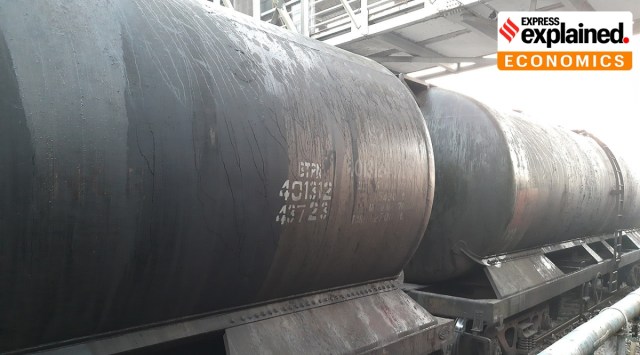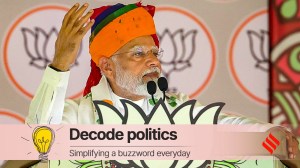- India
- International
More than $300 million dividends of Indian oil PSUs are stuck in Russia. Why — and what now?
Over the years, Indian PSUs have invested billions of dollars in Russian oil and gas projects. With the wartime sanctions on Russia, the dividend income is now stuck there. And there appears to be no easy and straightforward way out of this situation.
 The rapid expansion in oil trade between the two countries resulted in Moscow storming into the club of India’s top 5 trade partners for the 2022-23 fiscal. (Wikimedia Commons, Representational)
The rapid expansion in oil trade between the two countries resulted in Moscow storming into the club of India’s top 5 trade partners for the 2022-23 fiscal. (Wikimedia Commons, Representational) The dividend income of public sector oil companies ONGC Videsh (OVL), Oil India (OIL), Indian Oil Corporation (IOC), and Bharat PetroResources (BPRL), from their investments in Russian projects, totalling well over $300 million, are stuck in that country, parked in an Indian bank there.
The reason? Payment channel-related issues in the aftermath of Russia’s February 2022 invasion of Ukraine.
Soon after the war in Ukraine began, a number of major Russian banks were banned from the Society for Worldwide Interbank Financial Telecommunication (SWIFT) financial transactions processing system, seriously constricting Moscow’s ability to access the global payments system.
In addition, the Russian government too has put curbs on the repatriation of dollars in a bid to keep exchange rate volatility in check.
The Indian companies, which have invested billions of dollars in Russian oil assets, are now in a huddle to consider options to repatriate or access and use that money. But it may not be that simple. Here’s why.

How much has India invested in Russian oil assets and where?
Over the years, Indian public sector companies have invested billions of dollars to pick up stake in producing oil and gas projects in Russia. These investments — adding up to almost $6 billion according to one estimate — are part of India’s energy security strategy as the country is heavily dependent on energy imports. A long-standing strategic partnership between India and Russia has been a significant factor in these deals.
OVL, the overseas investment arm of Oil and Natural Gas Corporation (ONGC), holds a 20% stake in the Sakhalin-1 project and 26% in Vankorneft field. It also owns Imperial Energy, which has fields in Siberia. A consortium of IOC, OIL, and Bharat Petroleum Corporation’s (BPCL’s) upstream arm BPRL has 23.9% share in Vankorneft and 29.9% in Taas-Yuryakh Neftegazodobycha fields.
And how much dividend income is stuck in Russia, and since when?
While Indian companies were receiving regular dividend income from their investments in Russia until the invasion of Ukraine in February 2022, they have not been able to repatriate the dividend income since the war began.
To be sure, Russian companies operating the projects are releasing dividends to their Indian partners, but the money is piling up in the Commercial Indo Bank (CIBL) in Russia. The Indian companies are earning some interest on it as well.
There is no official data available for dividend income parked in CIBL. In April, a top government official had said that dividends stuck in Russia were estimated at around $400 million at the time. But the actual sum could be higher.
The consortium of IOC, OIL, and BPRL has around $300 million in unpaid dividends parked in CIBL. Dividends belonging to OVL are also piling up.
CIBL used to be a joint-venture of SBI and Canara Bank, but the latter recently sold its stake in the venture to SBI.
So what options, if any, are available to these companies now?
India and Russia have been regularly discussing the issue, and efforts are on from both sides to resolve it, a senior government official said. But the official also added that while the dividend dues are not small, they are insignificant in comparison to the overall oil trade between Russia and India, and have no bearing on it.
Even as the government is taking up the issue with Moscow, the Indian companies have been weighing feasible options for accessing and using that money, even if it cannot be repatriated to India immediately.
Theoretically, the money can be used to partly pay for India’s ballooning purchases of Russian crude. But there are multiple challenges in the way, a senior official with one of the consortium members said.
Firstly, while IOC and BPRL’s parent BPCL do buy Russian oil, OIL does not. Secondly, the investments in Russian projects are through special purpose vehicles (SPVs) registered in overseas territories like Singapore. This means that any payment dealing with Russian oil in this case would also come under the jurisdiction of overseas territories, and not just Russia and India.
It is worth noting here that there are various Western sanctions against Russia and its energy sector. Therefore, cross payments for Russian oil using this dividend income could end up becoming an extremely complex exercise from taxation and accounting standpoints.
Another way to access and use the dividend income could be for future investment in the same projects. But the challenge there is that the assets that Indian companies are invested in are past their major capital expenditure cycle, and are now producing assets. This means that major cash calls, or demand for more investment in the projects, are highly unlikely in the near-to-medium term, officials said.
Suffice it to say that there appears to be no easy and straightforward way out of this situation. Any feasible and workable solution is likely to emerge only through a combination of deft diplomacy and ingenious commercial negotiations with stakeholders in Russia and elsewhere.
More Explained
Must Read
EXPRESS OPINION
Apr 23: Latest News
- 01
- 02
- 03
- 04
- 05








































